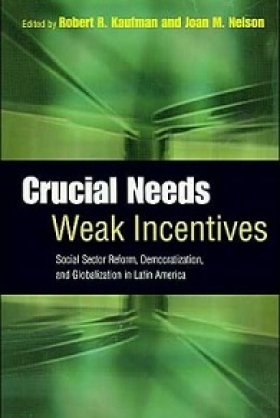
-
Crucial Needs, Weak Incentives studies the politics of efforts to reform education and health services in Latin America in the 1990s. Both sectors were common targets of reform—education because of its economic importance, health care because of needs to reduce great inequities of access and opportunities to increase domestic savings presented by reforms. Both sectors also have large numbers of unionized public employees, whose presence affects patronage as well as political power.
The book presents case studies that offer a wealth of new information not previously accessible to the English-speaking academic and policy community. For health care, these cover Mexico, Argentina, Colombia, Brazil, Costa Rica, and Peru; for education, Mexico, Argentina, Colombia, Brazil, Nicaragua, and Venezuela. Four chapters by the editors set out for each sector the goals, structure, and outcomes of reform efforts.
Contributors are Marta Arretche, Josefina Bruni Celli, Mary A. Clark, Javier Corrales, Sônia M. Draibe, Christina Ewig, Alec Ian Gershberg, Alejandra González Rossetti, Merilee S. Grindle, Peter Lloyd-Sherlock, Pamela S. Lowden, and Patricia Ramírez.
Robert R. Kaufman is a professor of political science at Rutgers University. Joan M. Nelson is a senior scholar at the Woodrow Wilson International Center for Scholars and a scholar in residence at the School of International Service at American University.
Editors
Browse Insights & AnalysisExplore More
Browse Insights & Analysis
The Real Reason Putin Targets Schools?
Posted date/time:
Rethinking NGO Effectiveness: Lessons from Rwanda’s Early Childhood Development Programs
Posted date/time:Source: New Security Beat
The Impact of War on Ukraine’s Youth and Workforce Development
Posted date/time:

